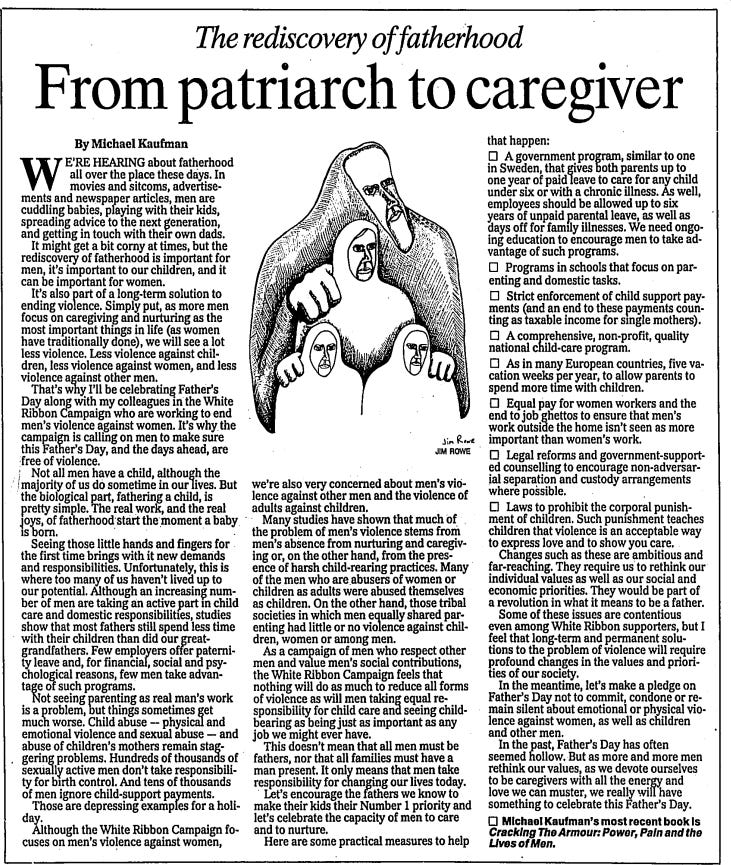On Father’s Day, Can We Please Stop Lecturing Dads?
Long before they replaced mothers with “birthing persons,” fathers were being told to be more like mothers
The year-round war on masculinity becomes particularly acute near Father’s Day, the lead-up to which is often filled (quite unlike for Mother’s Day) with politically correct exhortations about what a father should and shouldn’t be. In particular, we’re told that traditional notions of dad as the provider, the disciplinarian, the roughhouser, and the law-giver are no longer relevant, and must be replaced by a more inclusive, feminine figure who spells off Mom, is in touch with his feelings, and pulls his weight at home. This version turns out to be not very inclusive—and often risibly incoherent.
Let’s grant right off that not all fathers are alike. My dad, a somewhat shy and laconic man, never raised his voice in our house and left most decisions to my mom. At 5’8” and 155 lbs., he was hardly macho (though he was tough and stoic, a commercial fisherman who lost his brother to the sea). Some dads are more demonstrative than others, some more comfortable in the kitchen. Some, of course, aren’t role models at all. But please, let’s stop pretending that fathers are meant to be a watered-down version of mom, often a work-in progress needing coaching in their adjunct role. This is a rank untruth intended to emphasize that fathers, existing mainly to “support,” are ultimately secondary and dispensable.
This year, we’re being taught about the new and improved dad by Glenlivet, a maker of Scotch whisky that seems to have decided to follow in the footsteps of Gillette’s “toxic masculinity” campaign from a few years back. A slick 4-minute video, “What Does it Mean to Be a Dad Today?” presents four father-son/father-daughter pairs. Each pair reads an (allegedly) AI-generated script about fatherhood that all agree is lame and “stereotypical.” The script tells of a father who takes his son camping to teach him survival skills like building a fire with nothing but twigs and stones. The daughters are infuriated that the script assumed a male child and are contemptuous of the activities described. All scoff at a dad who wants to teach his son to handle himself in difficult situations.
As if on cue, one son opines that the AI script shows an “anxious” masculinity, one “trying to live up to what it means to be a man”—allegedly evidence of our culture’s paucity of good “inputs” about fathers. Everybody agrees that modern dads are a heck of a lot more various and relevant than the stereotype who takes his son fishing to toughen him up. The whole fake production—and I don’t believe for a minute that AI generated that script—is softer than Gillette’s attack ad, but no less doctrinaire.
What is the modern fatherhood the Glenlivet actors propose instead? That’s the problem. When asked to talk about what their dads have been to them, the opinionated group falls back on clichés. One of the daughters waxes rhapsodic that her dad’s rugged exterior hides a “marshmallow” inside; it’s affectionate, maybe, but not much of an endorsement. The other daughter praises her father for teaching her “empathy” and “self-confidence,” though in the production these look more like preening self-love.
The sons have even less to say about what their father has taught them. They certainly don’t mention any typically masculine attributes like pushing limits or resilience: nothing about how to impress an employer, stand up for themselves, or (please no!) win a fight, and no techniques for wooing girls either. They rely on inanities about how their fathers were “there for them.” One son pays tribute to his dad’s “positive masculinity,” which apparently means that he “doesn’t shy away from his feelings.” The general message is to deny anything distinctive in what men offer their children. Fathers are fine, the ad insists, but at best they replicate mom at a lower level.
Common-sense experience and published academic studies tell an entirely different story about dads, detailing, as in a 2016 clinical report by the American Academy of Pediatrics, how fathers’ “unique, dynamic” styles of play and distinctive interactions “decreased […] behavior problems and enhanced social competence” in their children. The report concludes that “fathers do not parent like mothers, nor are they a replacement for mothers.” A 2018 meta-study involving 37,000 participants confirmed that fathers raise children quite differently from mothers, helping children prepare for the realities of life through dads’ higher expectations, more realistic assessments, and more active monitoring of children’s behavior. “To be truly pro-child,” the researcher in charge of the study concluded “is to be pro-father.”
So why does our modern culture work so hard to convince us that the classic dad-ideal has outlived its usefulness? From radical feminist Kate Millett in Sexual Politics (1970) to contemporary family abolitionist Sophie Lewis, the revolutionary desire to smash gender roles and remake society requires the destruction of strong men and father-led families. Millett was clear that “The chief contribution of the family in patriarchy is the socialization of the young […] into patriarchal ideology’s attitudes” (p. 35). Contempt for fathers—and the demand that they cede authority to their wives and children—is a long-standing feature of such utopian projects and the corporate entities that now promote them.
In that sense, there’s nothing new about the Glenlivet ad’s father, and there have been worse portrayals in the past. Thirty years ago, on June 18, 1993, pundit and member of the (feminist) White Ribbon Campaign Michael Kaufman published an op/ed in the Toronto Star titled “From Patriarch to Caregiver: The rediscovery of fatherhood.” At first, the article sounded themes similar to the Glenlivet ad, telling us that the distant father, devoted to his career, was at last being replaced by the involved father who took an equal role in “childcare and domestic responsibilities.” Not enough fathers were yet doing their bit, but at least the ideal was being more widely promoted. What was coming, Kaufman insisted, was nothing less than “a revolution in what it means to be a father.”
Then the article took a darker turn, scolding men for their failures. There were programs at workplaces to enable men to have paternity leave, but men didn’t take advantage of them. Some men shirked their responsibility for birth-control or ignored child-support payments. Worst of all, “male violence” against women and the abuse of children were still “staggering problems.” Though Kaufman assured readers that White Ribbon opposed all forms of violence (including “men’s violence against men” and “the violence of adults against children”—no mention, significantly, of women as perpetrators), the decision to choose Father’s Day spoke for itself.
“From Patriarch to Caregiver” was far less interested, it turned out, in childcare and domestic responsibilities than in recruiting men to become self-hating supporters of feminism. Kaufman lectured his male readers to “make sure this Father’s Day, and the days ahead, are free of violence” and exhorted them “not to commit, condone, or remain silent about emotional or physical violence against women, as well as children or other men” (note the tell-tale other). Goaded into action by an alleged mass failure of masculinity, men were to confront their fellow men, shaming and castigating them.
That ending violence isn’t a job for “marshmallows,” for fathers indistinguishable from mothers, folding nappies and getting out the vacuum cleaner, never seems to bother the ideologues. Men are to be nurturing, soft, and empathetic, happy to wage war against dust bunnies and not afraid to cry in front of their sons—except when they’re needed for the dangerous roles that nobody expects a mom to take on. Then they’re to be as tough and aggressive as necessary to stop “male violence.” Singled out for blame through the decades, they are also singled out to sacrifice even as the expectation of sacrifice is denied. It’s an impossibly self-contradictory message, and it comes not from an outdated culture of “anxious” masculinity, but from deep within the feminist-compliant propaganda.
My dad, like most of his friends, was too busy providing for his family and volunteering in the community to give a damn about the shrill cries and smug condescension of feminist advocates, for whom he felt nothing but mystified contempt. The vast majority of dads already know that raising children requires all their tenderness and all their toughness. They already know what a heartbreaking, energizing burden it is, one that is rarely socially rewarded and too often, as we see above, demeaned or even excoriated. For divorced dads who’ve had to fight for years even to see their children, the dismissive jocularity and censoriousness have an added sting.
That’s our culture today. Perhaps the Glenlivet executives who approved “What Does It Mean to be a Dad Today?” were confident that mocking traditional dads was far less risky than promoting a trans influencer or apologizing to women for sexist beer commercials, or even telling them their razor-stubble is toxic. Men are used to the insult by now, and it doesn’t stop them from forging ahead on their own terms. It might stop them, though, from drinking Glenlivet.





I see this a LOT. In our parish, the Mother's Day sermon is always about how amazing moms are. (And I agree!) But the Father's Day sermons are always lectures about the failings of fathers.
Gee, thanks.
About 500,000 years ago, our ancestors started becoming a bi-parental species. We know that because today's brain imaging shows paternal behavior originating in the newest part of our brain, the cerebral cortex that began developing about 500,000 years ago. Meanwhile, maternal parenting comes from the oldest parts of our brain, the amygdala and other ancient structures. As a bi-parental species (one of the few in the mammalian world), our children need and do best when they receive different parenting from Dad than from Mom. Kids do best when they receive both and each parenting style tends to support and mesh with the other. To the extent that we teach fathers to parent like mothers, we do them, our children and our societies a grave disservice.